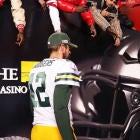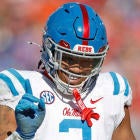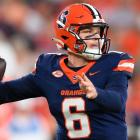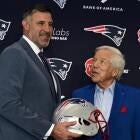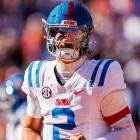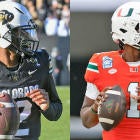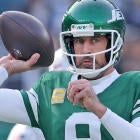SANTA CLARA, Calif. -- One by one, like soldiers withdrawing from the trenches, the Packers sauntered off the field at Levi's Stadium and through the tunnel connecting the battlefield to the locker room. As confetti fell from the heavens and coated the grass, celebratory music and the joyous screams of victory followed them through the corridor of defeat. Nobody talked. Each player still in possession of a helmet handed it to a member of the equipment staff, who filed them away into bins, before disappearing into the locker room. Soon, the players stopped coming. The bins were wheeled away. The doors to the locker room closed. The entire operation took minutes.
It was about the only thing that went as designed, without landmines or self-imposed destruction, for the Packers on Sunday night, when they returned to Santa Clara for a rematch with the top-seeded 49ers and proceeded to get demolished just as they did back in Week 12. By the time the confetti dropped and the Packers were behind closed doors to reflect on a loss that ended their season one game shy of the Super Bowl, the scoreboard read 37-20 in favor of the 49ers. But the game was over after 30 minutes, when the 49ers jogged into halftime holding a 27-0 advantage that surpassed the 23-0 lead they held at halftime of their 37-8 win over this same Packers team two months ago.
Behind those closed doors, linebacker Blake Martinez fought back tears as he contemplated an uncertain and unknowable future heading into free agency. Center Corey Linsley expressed regret and disbelief for the botched exchange with Aaron Rodgers that killed the Packers' chances of mounting a comeback just when things finally appeared to be going their way. Right tackle Bryan Bulaga acknowledged that everything that could go wrong did go wrong in the first half, but was steadfast in his belief that they -- not the football gods or the universe or bad luck or anything or anyone else -- deserved the blame.
"When you don't execute, I'm not going to sit here and say nothing is going our way. That's on us to get things to go our way. I'm not going to look at it and just say that's luck," Bulaga said. "We need to be better to get things to go our way. We just didn't do that."
Super Bowl LIV is set and there's a lot to go over. John Breech and Ryan Wilson join Will Brinson to break down the conference title games and more on the Pick Six Podcast. Listen below and be sure to subscribe for daily NFL goodness fired into your eardrums.
It was a system-wide failure that resulted in their third NFC Championship Game loss over the past six seasons.
"I'm (expletive) annoyed," said left tackle David Bakhtiari. "It's like a monkey we can't get off our back, but I've got a lot of faith in this organization, and I've got faith in the guys in this locker room that they're going to do the right job to get us over the hump."
The offense failed, coming up entirely empty until the game was out of reach. They punted on their first three drives. Their next two possessions ended with turnovers. Their final series of the first half resulted in a punt.
An offensive line that finished the regular season with the league's best pass-block win rate failed to withstand the 49ers' relentless four-man rush. The Packers' second series -- with the team already trailing 7-0 -- ended with a sack on third-and-7 when the 49ers' front four won against the Packers' front five, with Dee Ford flushing Rodgers out of the pocket into the waiting arms of Nick Bosa. Rodgers lost 13 yards -- partly because his protection failed to hold up, partly because Rodgers declined to throw the ball to an open man.
Welcome to the NFC Championship Game @nbsmallerbear 😤
— San Francisco 49ers (@49ers) January 20, 2020
¯\_(ツ)_/¯ pic.twitter.com/XN2gUes6Y5
Rodgers needs to pull the trigger here. That sack is on him. pic.twitter.com/CsJSwu7neJ
— Michael David Smith (@MichaelDavSmith) January 20, 2020
The Packers' third series ended when the 49ers -- a team that blitzed 20.9 percent of the time in the regular season (the fourth-lowest rate) -- sent extra rushers and the Packers didn't pick up K'Waun Williams. After a fumble and subsequent recovery, the Packers lost 15 yards on a third-and-6.
The Packers allowed only two sacks in the first half, but the sack total doesn't capture just how much they were bullied up front. Rodgers averaged 2.88 seconds to throw in the regular season, per Next Gen Stats. On average, only five quarterbacks held the ball longer than Rodgers. Against the Seahawks last week, in a game that saw him look more like the great quarterback he once was, Rodgers held the ball for an average of 3.16 seconds. But the Packers weren't facing a Seahawks defense that is far more reliant on the blitz to generate pressure. In the early going on Sunday, Rodgers was averaging 2.38 seconds to throw, which would've been Rodgers' quickest release time in four seasons. Rodgers started the game 6 of 6, but on his first eight drop backs, the Packers gained negative yards.
Rodgers wasn't given the kind of protection he was provided during the regular season, but his conservative approach was a detriment to the team. He's often been one of the more risk-averse quarterbacks in football, a strategy that worked just fine in the regular season as the Packers leaned on their ground game and defense to beat inferior teams. But in a game where the Packers needed Rodgers to play like the Aaron Rodgers of 2016 to beat a superior opponent, they got the Rodgers of 2019.
The 49ers moved Richard Sherman around the field for the first time all season to take away Davante Adams instead of letting him shut down the left side of the field, as he almost always does. It worked. As Rodgers did five years ago in Seattle, he ignored Sherman almost entirely in the first half.
On the one hand, avoiding Sherman isn't necessarily a bad thing considering it limits Sherman's ability to impact the game the way the league's top corner of the past decade so often does. On the other hand, cutting the field in half is seriously debilitating to an offense.
Richard Sherman has not been targeted as the nearest defender on 11 snaps in coverage through the 1st half.
— Next Gen Stats (@NextGenStats) January 20, 2020
Sherman by Alignment: 16 LCB, 6 RCB
Aaron Rodgers has not attempted a pass beyond the line of scrimmage to the right side of the field.#GBvsSF | #GoNiners pic.twitter.com/ccgLBrv2vl
Even though Rodgers tried to play risk-free football, two giveaways sealed the win for the 49ers before halftime. Trailing 20-0 with just over a minute in the half remaining, Rodgers threw behind Geronimo Allison. Emmanuel Moseley snagged the errant throw. The 49ers took a 27-0 lead three plays later.
At the podium after the game, Rodgers said he wasn't on the same page with Allison, but refused to blame the pick on a miscommunication, taking ownership for a poor throw.
OK E MAN 👀@Mannymoseley picks off Rodgers 💪#BeLegendary pic.twitter.com/UuGwPV5tOa
— San Francisco 49ers (@49ers) January 20, 2020
That mistake was preceded by an even more disastrous and preventable blunder. Trailing 17-0 midway through the second quarter, the Packers were in the process of mounting a dangerous drive that would've pulled them back to within two scores. But on second-and-5 at the 49ers' 25-yard line, Linsley and Rodgers bungled the center-quarterback exchange. DeForest Buckner recovered the loose ball as Rodgers stood and watched. The drive ended without the 49ers being forced to produce a stop.
Defense is cookin! @DeForestBuckner recovers the fumble 💥#BeLegendarypic.twitter.com/9joEWYu7Sw
— San Francisco 49ers (@49ers) January 20, 2020
Did the center snap this into his own butt? pic.twitter.com/S6QDdBkpXU
— new-age analytical (@benbbaldwin) January 20, 2020
Rodgers finished 31 of 39 for 326 yards, two touchdowns, two interceptions, and a 97.2 passer rating, but his final numbers are deceiving. At halftime, he was 9 of 12 for 65 yards, one pick, two sacks that lost 23 yards, a 52.4 passer rating, and two fumbles (one of which he lost). In the portion of the game that mattered, Rodgers and the rest of the offense self-destructed.
All year long, we kept waiting for Matt LaFleur's offense with Rodgers to explode. Outside of a few scattered bangs, it never really did, at least not on a consistent enough basis.
"It was kind of a microcosm of our season," Rodgers said. "The inefficiency caught up to us."
It was a failure on defense.
The Packers' defense was utterly useless against a constant barrage of running plays. At halftime, 49ers running back Raheem Mostert had more yards (160, with 109 of those yards coming before contact) than the Packers offense (92). They gave up a rushing touchdown on third-and-8. Mostert finished the game with 220 yards and four scores on 29 carries, meaning he averaged 7.6 yards per carry.
He deserves credit for hitting the holes without hesitation and burning the Packers with his Millennium Falcon speed, but the 49ers' dominance on the ground was mostly about their offensive line pummeling the Packers. They were so dominant that the 49ers didn't have to throw the ball. Garoppolo was 4 of 6 for 48 yards at halftime. He went one hour and thirty-three minutes between pass attempts. He finished with eight pass attempts. That's how utterly useless the Packers' defense was against the run.
The holes were wide and reoccurring.
GOT HEEEEEM! @RMos_8Ball with the 36-yard TD 👏#GBvsSFpic.twitter.com/YBrTMGNEk6
— San Francisco 49ers (@49ers) January 19, 2020
this Deebo Samuel block 👨🍳😗 pic.twitter.com/kGl1j6uPl8
— Christian D'Andrea (@TrainIsland) January 20, 2020
Niners creating all kinds of open grass for anyone they hand the ball off to pic.twitter.com/VYA46c6YzL
— Riley McAtee (@RileyMcAtee) January 20, 2020
I mean come on pic.twitter.com/oqg7tdeD6q
— Riley McAtee (@RileyMcAtee) January 20, 2020
this running lane is ridiculous pic.twitter.com/1g0MPVM6md
— Riley McAtee (@RileyMcAtee) January 20, 2020
It was a failure on special teams.
J.K. Scott shanked a punt to give the 49ers the ball at the Packers' 37-yard line. The punt team gave up a 26-yard return. Returner Tyler Ervin muffed a kickoff and pinned the offense back at its own 8-yard line.
It was a failure in coaching.
The Packers actually began the game with promise. They forced a three-and-out and quickly journeyed to midfield. But on fourth-and-1, even though they were eight-point underdogs on the road, they punted.
And now an error by Matt LaFleur on 4th & 1 at midfield costs the #Packers 3% GWC.#GBvsSF
— EdjSports (@edjsports) January 19, 2020
The defensive coaching staff never adjusted to the 49ers' run-heavy approach, opting to operate out of nickel/dime against a team that had no intention of throwing the ball. They never forced the 49ers to throw the ball with a quarterback who might be the only exploitable flaw on an otherwise great team. They let the 49ers run all over them.
Like Packers did all season, they played a lot of nickel/dime to defend pass. SF used heavier personnel and ran. So often 49ers created the numbers/angle advantage. Per @NextGenStats, Raheem Mostert ran against a box of 8+ on just 13.8% of his carries. https://t.co/klHt42JRwV
— Dan Pizzuta (@DanPizzuta) January 20, 2020
They knew they needed to stop a 49ers rushing attack that accumulated the second-most carries in the regular season, but they couldn't. They knew it. We knew it. The 49ers knew it.
It didn't matter.
"We had to stop the run," said Packers defensive lineman Dean Lowry. "There's no secret to that. Like I said, they came in from the first series and made no secret about it. It was also a combination of things like poor tackling, poor angles, guys out of their gaps, and we have to fix that."
The truth is, all along, even though the Packers vanquished a good Vikings team to capture the NFC North with a 13-3 record, this Packers team never felt like it was as good as its record indicated. The Packers went 13-3 with a plus-63 point differential. The 49ers went 13-3 with a plus-169 point differential. Green Bay always felt like a lucky team -- with a 9-1 record in one-score games serving as evidence. At 13-3, the Packers weren't a bad football team. But they also weren't worthy of a 13-3 record.
Green Bay and the worst 13-3 (or better) teams in DVOA history (since 1985). The 1999 Colts are the only 13-3 team to come out worse than this year's Packers by DVOA. pic.twitter.com/YEOrCiAmTM
— Aaron Schatz 🏈 (@FO_ASchatz) December 30, 2019
"I wouldn't say this was our most-talented team," Rodgers said. "But neither was 2010. We just found a way. And we found a way a lot this year."
The Packers' good fortune doesn't invalidate the success they found this season, but it is best viewed as a warning for the future, because unless they make improvements, they probably won't get to 13-3 again by winning so many close games. They'll become the latest team to fall victim to regression. Reinforcements are needed. Growth in LaFleur's system is paramount. That's how they can overcome regression and journey one step further, going from January to February.
After, Rodgers expressed faith in general manager Brian Gutekunst to continue building a Super Bowl-caliber team. He also admitted that the playoff losses nowadays weigh on him more than they did in his twenties, because "I don't have the same number of years ahead of me as I do behind me."
At 36 years old, Rodgers is entering the twilight of his career. The advanced metrics over the course of the entire season indicate he's past his peak. He's running out of time to capture the second championship his first-ballot Hall-of-Fame career deserves. After winning only one Super Bowl with Brett Favre, the Packers are running out of chances to win a second with Rodgers. Sunday was yet another opportunity that eluded their grasp.
At this point, it's worth wondering how many more chances they'll get.
"It's a little raw right now, for sure," Rodgers said. "It definitely hurts a little more than early in your career, just because you realize just how difficult it is to get to this spot. With all the changes this offseason and the installation of a new system and a new program, to get to this point, you felt like it was something special because it just didn't really make sense. We weren't picked by most people to win our division, but we found a way to not only to do that, but to win a home playoff game and get to this spot.
"It just kind of felt like it was meant to be, almost."
![[object Object] Logo](https://sportshub.cbsistatic.com/i/2020/04/22/e9ceb731-8b3f-4c60-98fe-090ab66a2997/screen-shot-2020-04-22-at-11-04-56-am.png)









